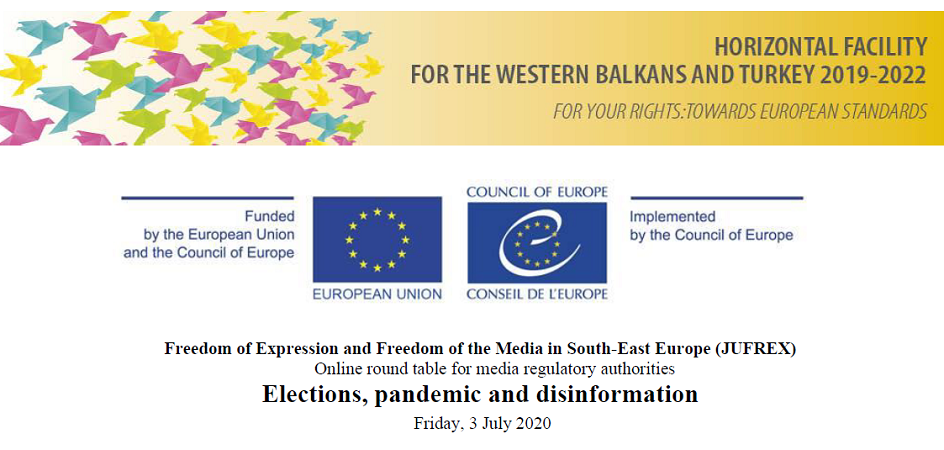In these difficult and uncertain times, the European Union and the Council of Europe are determined to contribute to the international and local discussions and standard setting on freedom of expression to ensure that citizens are provided with reliable and accurate information to ensure their safety and meaningful participation in democratic processes such as elections.
In order to maintain the yearly dialogue among media regulatory authorities, under the auspices of the European Union/Council of Europe joint action “Freedom of expression and freedom of the media in South-East Europe (JUFREX)”, a regional online round table “Elections, pandemic and disinformation” has been organised on 3 July 2020.
Patrick Penninckx, Head of the Information Society Department of the Council of Europe opened the event highlighting the importance of discussing those topics given that the current sanitary crisis has led to an increase in disinformation which poses not only risks to public health, but also to the democratic functioning of our societies, in particular with regard to holding free and fair elections.
Liselotte Isaksson, Head of Sector – Civil Society and Social Inclusion, Western Balkans Regional Co-operation and Programmes, DG NEAR, European Commission welcomed the co-operation of media regulatory bodies on the issue of disinformation, having in mind their important role in the media sector. She also underlined the EU's efforts to support strategies and activities that contribute to improvements in this field, such were activities on strengthening of co-operation with the video sharing platforms, undertaken during the pandemic.
This online round table offered an opportunity for exchange between media regulatory authorities and Council of Europe experts on activities and responses to challenges brought about by Covid-19 infodemics, and disinformation in election-related matters, but also wider implications of current trends and dangers to democratic processes.
One of the conclusions of the event is that a paradigm shift is needed. Key stakeholders, such as representatives of media regulatory bodies and data protection agencies, electoral commissions and the business sector both in terms of media institutions and intermediaries, civil society organisations and academics have a role to play when it comes to the challenges related to media and the digital world during elections and beyond. An informal platform among these actors, if accompanied by European standard-setting institutions, will serve to jointly promote European standards in terms of regulation, ethical standards and co-regulation, but also media and information literacy, empowerment of quality journalism, ensure compliance of online platforms and contribute to awareness-raising on the issue of disinformation, including on the manipulative capabilities of AI systems. Information gathered during the event will be used as a basis for EU/CoE joint activities and further co-operation with media regulatory authorities from South-East Europe.
The action on “Freedom of expression and freedom of the media in South-East Europe (JUFREX)” is a part of the joint European Union/Council of Europe programme “Horizontal Facility for the Western Balkans and Turkey 2019-2022”. This co-operation initiative enables the Beneficiaries to meet their reform agendas in the fields of human rights, rule of law and democracy and to comply with the European standards, including where relevant within the framework of the EU enlargement process.




